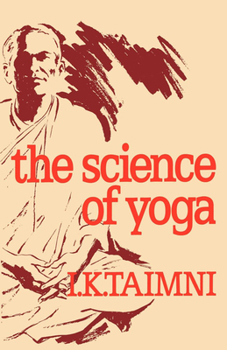Science of Yoga
Select Format
Select Condition 
Book Overview
Commentary on Patanjali's sutras. Updated edition.
Format:Paperback
Language:English
ISBN:0835600238
ISBN13:9780835600231
Release Date:January 1961
Publisher:Quest Books (IL)
Length:465 Pages
Weight:1.13 lbs.
Dimensions:1.2" x 8.4" x 5.6"
Customer Reviews
3 ratings
Sutras
Published by Thriftbooks.com User , 15 years ago
Good translation, the commentary is extensive and often over wordy but an interesting take, also available free online
Important but overlooked classic
Published by Thriftbooks.com User , 23 years ago
It remains surprising that so few Westerners have translated or commented on the Yoga Sutras of Patanjali, which play a significant role in the transition from a more primitive Hinduism to a mature Vedantaism. Translations are not difficult (these sutras are one-line aphorisms) but capturing the essence and understanding the context is essential. Of existing translations with commentary, Taimni's has the virtue of scholarship, even objectivity. He understands the highest achievements of his author and of the Vedanta tradition. Still, it is a large, even ponderous book, written in big block paragraphs that run to wordiness and repetition. There is no historical or bibliographical apparatus, and the novice will be quickly put off. But Patanjali is important enough to pursue, and this is, with all its shortcomings, the best available version.
It is the best book on the yoga sutras
Published by Thriftbooks.com User , 25 years ago
Taimni was a biochemist and his scientific viewpoint helps aid Westerners to understand the subtleties of Patanjali's yoga sutras. The author also starts each sutra with the Sanskrit and the translation before the commentary. He even includes diagrams to help the reader. The yoga sutras are a roadmap to spiritual progress. Taimni makes them exciting and useful to yoga practitioners and meditators, no matter if they are beginners or advanced. A sample set of quotes on pranayama are: "Deep breathing has nothing to do with Pranayama", "Real Pranayama begins when the breath is stopped for some time between inhalation and exhalation." For the advanced meditator who is interested in the last three stages of the eight fold path (dharana, dhyana, and samadhi), Taimni's commentary shows he is well-versed in those states of mind. For example, "In practicing Dharana, it is found that as the depth of abstraction increases and the grip over the mind becomes stronger, the frequency with which the distractions appear becomes smaller." The last half of the yoga sutras dwells on the advanced states of samadhi (including samyama) and here Taimni shines with detailed advice, unlike most other authors of similiar commentaries. "When the Yogi performs Samyama on any quality his mind becomes one with that quality for the time being as has been explained in I-41. The positive qualities like courage, compassion, etc. are not vague nebulous things as they appear to the lower mind but real, living, dynamic principles of unlimited power which cannot manifest fully in the lower worlds for lack of adequate instruments." For me, Taimni's Science of Yoga has been a life-long companion and a handbook to higher consciousness.






